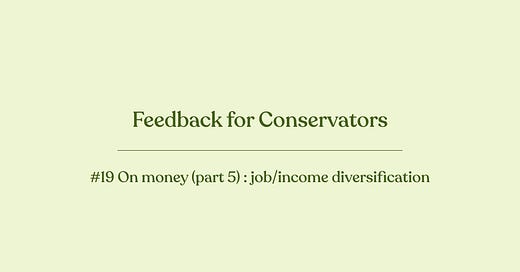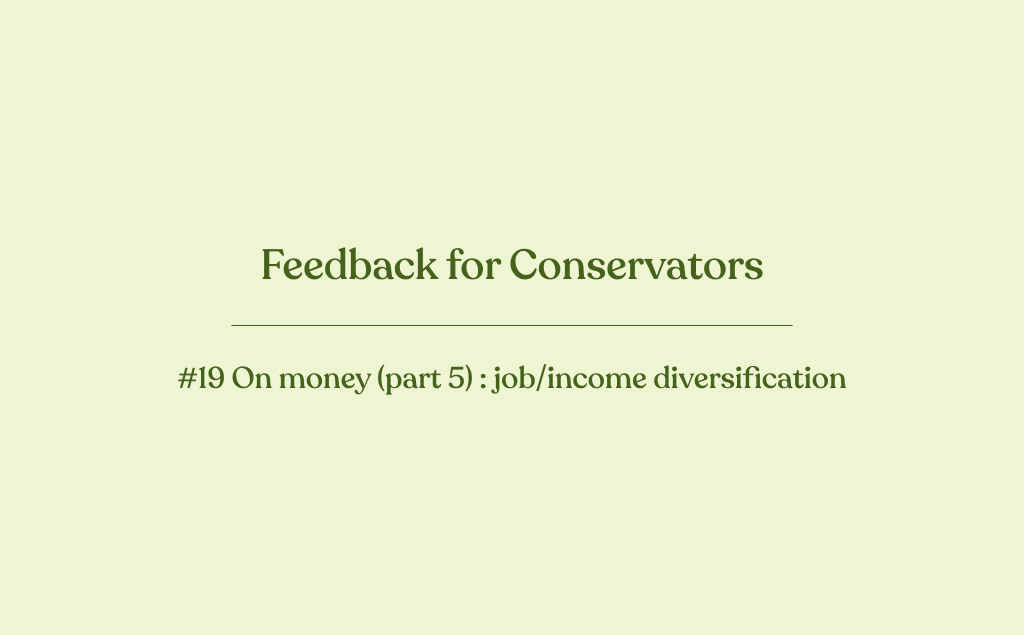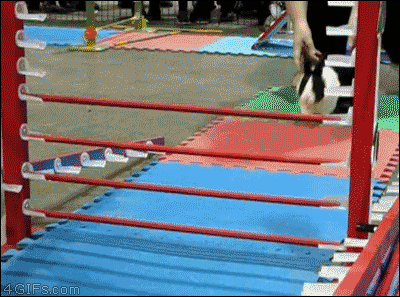This is a monthly free newsletter project that came from the Initiative Feedback for Conservators ✍️: a place to bring a little bit of professional advice to help on topics that I wish I knew more about at the start of my art conservation career. Topics discussed here are recurrent ones that I see over Zoom sessions! So I thought would be useful to discuss them here. It’s also not a perfect newsletter and doesn’t intend to, but rather a space to share. Read here past newsletters. And as always, some disclamers1
So! the last posts (1, 2, 3 and 4) belong to a section that fit into the same theme: Money and conservators, because we do not talk about it! This is the last post of this special section. Before diving into it a quick reminder: this is not money advice, is what has been my experience.
.
On money (part 5): job/income diversification
.
What is job diversification and why is important? 👩🏻💻
I said it before and I will say again: our work is a service-based job. You offer a service that someone might need or request. It seems very straight forward but is important to keep in mind that this is the core of it, even if the result and context are wonderful.
Most art conservators are freelancers, and many of them, while asked, they struggle to be able to point out easily what they can offer. Also, we tend to think of one single type of service, when at least there are 4 of them. It is important to be aware of them because well play out, they can also bring income diversification.
.
1. General services
Your core specialisation and the broad range of materials and tasks that you perform. We all know that an art conservator not only conservates objects: it documents them, does outreach, writes articles, works on preventive conservation, does consultancy etc. Sometimes if you do not list them, many clients will not guess that you can do it too.
.
2. Specific services: aka, niche services
A service that you’re good at it, quick, or simply very knowledgeable at it. This is something that ADDS to the general services that you will offer. Is this little extra that if a colleague who knows you well is asked to find an e.g. paper conservator of a complex treatment could say: “oh yes, I know this paper conservator, she’s very good at doing this X. If you need somebody for this type of project/treatment, go for her.”
Some colleagues find their niche over time, an area that they discover because they encountered it in several projects.
Others by repeatedly doing it over time, becomes an area that they are more familiar and other colleagues end up asking them about or inviting them to be part of projects where their skill is needed.
Others are very clear from the start and are developed over time and extracurricular training (e.g. tear mending, a specific support technique or period). Inserting here, strategy.
In any case, in most cases, everyone has at least two, and it is something important to highlight in the CV and motivation letters. These elements add more interest to a profile, but also in many cases help give a more clear lecture on your path (anchor points to see over your CV) and let them know what other things can you bring to the table.
.
3. Passive services
These are services that you can offer but do not imply a compromise of your time. They work for you. And hint, very few conservators take time to invest in this (only when situations such as buying a very expensive material or a maternity leave while being an art conservator make you reconsider how to do it). E.g:
renting expensive materials to other colleagues (scaffolding, a laser machine, a cleaning portable test kit…)
creating an e-course
renting part of your studio to a colleague so they can store their material or that they can work certain days a month or if they ever get a project of X and X.
.
4. Tranversal services
These are services that nourish several at the same time. E.g:
A workshop that you would do will bring you extra cash, while also helping you to be known by another branch of colleagues + also meet new ones that could maybe want you to join their projects because of your niche area that you presented on that workshop.
.
Job diversification = income diversification? 💶💵💷
It is quite well-known that income diversification will not avoid a bum in the road but will soften it. It thing though that sometimes we still confuse what means job/income diversification, E.g:
It means that having 3 main private art conservation studios that always offer you jobs is not income diversification, because if there is a recession, it will affect probably all of them equally (=same type of source, this is not job/income diversification).
It means that if you’re having always different job projects from several museums but suddenly there is a cut in public funding, it will affect probably all of them equally (=same type of source, this is not job/income diversification).
It means that if you’re always working with the same colleagues that search for the projects, if they decide to switch teams or have a problem with the client that they have the contact, you’re co-dependent and therefore out of a job (=same type of source, this is not job/income diversification).
.
So it is worth reflecting on your current case situation and if truly there is diversification or not. Careful, I am the first one who considers that consistency and trust will bring you long-term as well as new clients. But again, I found from my experience that having a combined type of services offered from different sources can help to create a diversified income, and therefore, have a stronger income net so if one goes off, is not the end of the world.
.
Some final thoughts
As a personal exercise, try to put in writing :
Have you ever listed all the services that you can offer?
Can you classify them on the mentioned types of services?
Do you feel that you have enough job/income diversification?
.
That’s a warp for today. More next month, see you then?
This GIF is the cutest one to summarise what a niche service is.
This is my personal opinion, which means also that I could be wrong! You do you✨.
Please do not share extracts of this newsletter without my consent.





